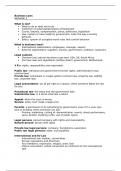Business Laws
Semester 1
What is law?
What to do or what not to do
Collection of acts/rules/principles of Parliament
Courts, lawyers, compensation, police, politicians, legislation
Law: system of rules made by government, order the way a society
behaves
Ethics: system of accepted moral rules that control behavior
What is business laws?
International stakeholders: employees, manager, owners
External stakeholders: suppliers, society, government, creditors, customers
Legal systems
Common law: judicial decisions (case law), USA, UK, South Africa
Civil law: laws and regulations (written down), government, Netherlands
3 R’s: rights, responsibility and reasonable.
Public law: individual and government (human rights, administrative laws,
criminal law)
Private law: individuals in a legal system (contract law, property law, liability
law, corporate law)
Legal presentation: we all got right to a lawyer, when someone fights the law
for you.
Procedural law: the steps that the government take
Substantive law: in a sense what law is about
Appeal: when the court is wrong
Review: when court made a legal error
Permits: a permission to do something by government, even if it is your own
land or building, when everyone can join.
- Pruning, replanting, cutting of, demonstration, events, street performance,
serve alcohol, shooting a film, use of public space.
Legal persons: person/company with rights and reasonability
Natural person: person with rights
Private law legal persons: company, foundations, associates
Public law legal persons: state, municipalities
International and EU Law
- International law: treaties, conventions
- EU law: regulations and directives
- Four freedoms: expression, religion, want, fear
- Vienna convention: united convention on contracts for the international
sale
, Rules
If you walk away when negotiation the person you walk away get
compensation
Consideration = money point 5 in other countries
You need proof, so you can proof that is valid
The law protects people under 18, because they can’t think right
Contracts
1. Offer
2. Acceptance/agreement
3. You can’t do something that is against the law
4. Intent to create legal contracts (both be okay with)
Vitiating factor
- Mis presentation could be problem
- Durries
- Intimidation/blackmail
Problem
- Void: massive problem with the contract
- Voidable: not a massive problem, you can continue and don’t pay
compensation
Liability: vic/strict liability when someone is held liable, it means they are
deemed responsible for their actions or negligence, and they may be required to
pay for damage/injury
Types of liability
- Contractual
- Non-contractual
Contractual breach: no contract because someone is negligence
1. Specific performance
2. Compensation
Non contractual elements
1. Unlawful act: action by someone, duty of care, negligence of someone
2. Causation: link between action and damage
3. Damage: there need to be damage or harm
4. Relativity: relationship between damage and interest
5. Fault negligence: what did the person had done?
Comparative negligence: victims also fault less compensation
Property law: the legal rule that govern a person’s rights to things
1. Immovable: buildings, land, property
2. Movable: clothes, desk, chair, phone
Change ownership movable
1. You must be the owner
2. Legal basis for the transfer
3. There is need to delivery





